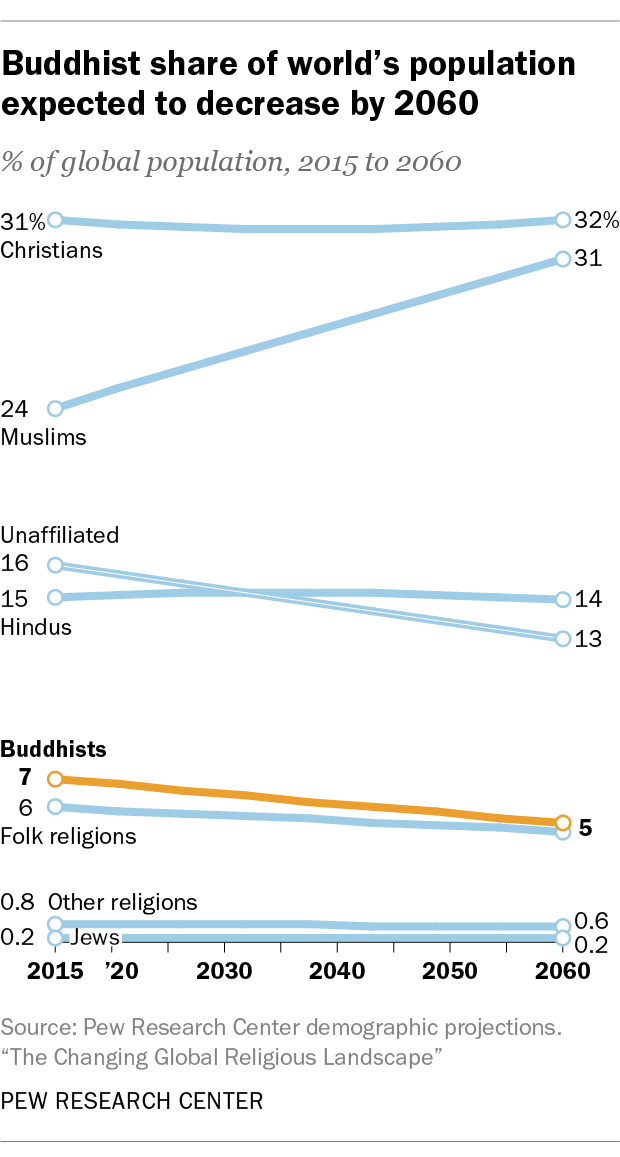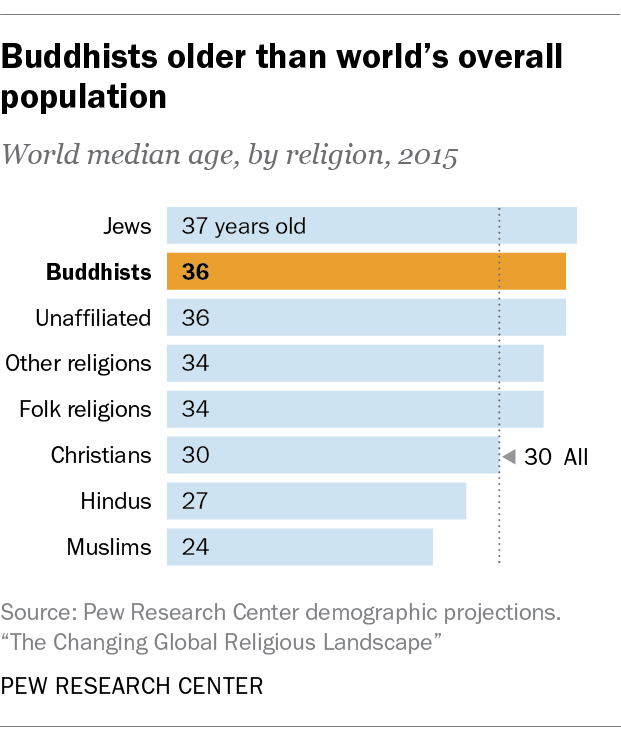
Buddhists across Asia are preparing to celebrate the birthday of Prince Siddhartha Gautama, who later became known as Gautama Buddha and was the founder of Buddhism. The Buddha is believed to have been born roughly 2,500 years ago in what is today Nepal. In Asia, where most Buddhists live, different countries celebrate the occasion on different days, including April 8 in Japan, May 12 in South Korea and May 18 in India and Nepal. The holiday goes by several names, including Buddha Purnima, Vesak, Buddha Jayanti and Ikh Duichen, and is often marked by national holidays, festivals and events at Buddhist temples.
Here are five facts about Buddhists:
1 Buddhists made up roughly 7% of the world’s population in 2015, but they are expected to decrease to roughly 5% by 2060. This is because Buddhists have relatively low fertility rates compared with other religious groups, and they are not expected to grow significantly due to conversions or religious switching.
Buddhists made up roughly 7% of the world’s population in 2015, but they are expected to decrease to roughly 5% by 2060. This is because Buddhists have relatively low fertility rates compared with other religious groups, and they are not expected to grow significantly due to conversions or religious switching.
2Half the world’s Buddhists live in China, according to 2010 Pew Research Center estimates. Still, they make up only 18% of the country’s population. Most of the rest of the world’s Buddhists live in East and South Asia, including 13% in Thailand (where 93% of the population is Buddhist) and 9% in Japan (35% Buddhist). Only about 1.4% of the world’s Buddhists live in countries outside of Asia.
Buddhism in Asia is a matter of both identity and practice. Scholars and journalists have documented that many people in Asian countries may engage in Buddhist (and other religious) practices without considering themselves part of any organized religion.
3Scholars generally agree that Siddhartha Gautama was born in what would today be Nepal and taught in what would today be India, but Buddhism is a minority faith in both countries. Only 1% of Indians and 10% of Nepalese identify as Buddhist; in both countries, the vast majority of people identify as Hindu. Indeed, since Siddhartha was born into a Hindu family, Buddhism is considered to have originated in part from the Hindu religious tradition and some Hindus revere Buddha as an incarnation of a Hindu deity.
4Buddhists make up roughly 1% of the adult population in the United States, and about two-thirds of U.S. Buddhists are Asian Americans, according to Pew Research Center estimates. Among Asian Americans, 43% of Vietnamese Americans and a quarter of Japanese Americans identify as Buddhist, with most of the rest identifying as either Christian or religiously unaffiliated.
5 With a median age of 36, Buddhists are older than the world’s overall population, which has a median age of 30, according to estimates as of 2015. They also are older than people in other major religious groups, such as Muslims (median of 24), Hindus (median of 27) and Christians (median of 30). Religiously unaffiliated adults have the same median age as Buddhists (36).
With a median age of 36, Buddhists are older than the world’s overall population, which has a median age of 30, according to estimates as of 2015. They also are older than people in other major religious groups, such as Muslims (median of 24), Hindus (median of 27) and Christians (median of 30). Religiously unaffiliated adults have the same median age as Buddhists (36).



